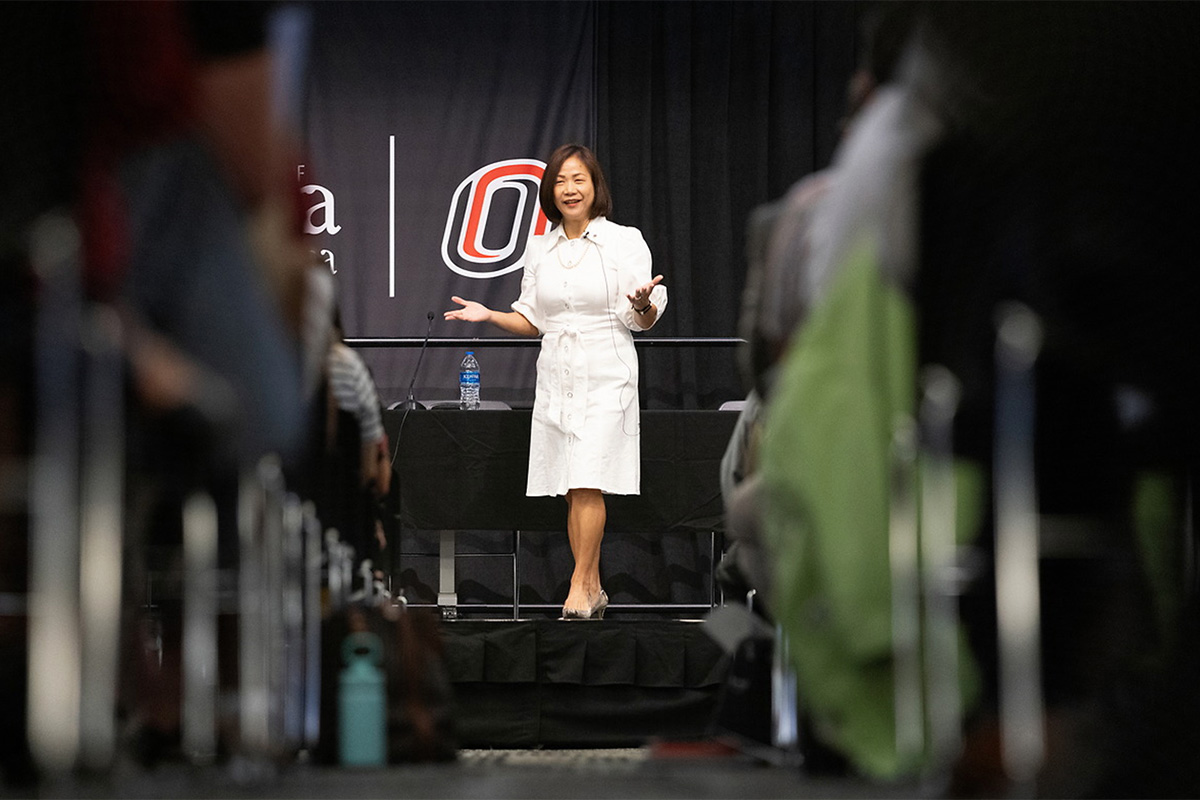Chancellor Li: We Got This
"We must remember going forward that patience, understanding, kindness, trust, and flexibility are essential to our success, and that our fight is with the pandemic, not each other."
- published: 2021/08/18
- contact: University Communications
- email: contact@unomaha.edu
- search keywords:
- Chancellor Li
- COVID-19
- masks
- vaccines
- Fall 2021
- strategic planning
- winter weather

Mavericks,
I want to thank the nearly 600 Mavericks who participated in our fall campus forum earlier this week.
Whether you attended in-person or viewed online, your engagement gave me a better understanding of all the opportunities in front of us as a university and reaffirmed why I am so proud to go to work for this university every day.
While we have many reasons to be optimistic about our future, many members of our university community understandably have questions and concerns regarding the COVID-19 pandemic. In fact, the majority of questions we received during and after the forum centered on our response efforts ahead of the start of the Fall 2021 semester on Monday.
The reality of our situation is that UNO is just one of many public universities around the state and the country who are operating in uncertain territory as we monitor each new development with the pandemic. Public health guidance at the federal, state, and local levels evolves rapidly and often lack the specifics that a large, matrixed organization like ours craves in order to be fully reassured. In the face of uncertainty, I have complete confidence that we have implemented the guidance and policies that we need to keep campus healthy and safe as we begin the Fall 2021 semester. We will remain agile and adaptable to mitigate risk as we monitor this ongoing situation.
The common-sense approaches we are taking include:
-
Encouraging all Mavericks to receive the COVID-19 vaccine
-
Requiring mask-wearing for those who are not vaccinated and encouraging mask-wearing indoors for all students, faculty, and staff
-
Requiring approval for events and gatherings of more than 25 attendees where masks may be required in order to attend
-
Mandatory regular testing will be required every two weeks for on-campus residents who are not fully vaccinated.
Above all, we must remember going forward that patience, understanding, kindness, trust, and flexibility are essential to our success, and that our fight is with the pandemic, not each other. Our Executive Director for the Office of Health Security Dr. Jane Meza has demonstrated each of these qualities throughout the pandemic and I applaud her leadership.
If you have not already done so, please visit the Fall 2021 Guidance page on our Maverick COVID Response website. From there you will find answers to many of your questions and information that will allow for a safe and successful semester. All current guidance is subject to change, so check the website, monitor your email, and follow UNO on social media for updates.
I look forward to hearing from you in the coming months as I continue to listen and learn from our Maverick community.
Sincerely,
Joanne Li, Ph.D., CFA
UNO Chancellor
About the University of Nebraska at Omaha
Located in one of America’s best cities to live, work and learn, the University of Nebraska at Omaha (UNO) is Nebraska’s premier metropolitan university. With more than 15,000 students enrolled in 200-plus programs of study, UNO is recognized nationally for its online education, graduate education, military friendliness and community engagement efforts. Founded in 1908, UNO has served learners of all backgrounds for more than 100 years and is dedicated to another century of excellence both in the classroom and in the community.
Follow UNO on Facebook, Twitter (X), Instagram, LinkedIn, and YouTube.